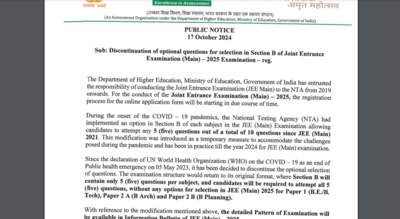- News
- Education News
- News
- JEE Main 2025 exam pattern change may lead to reduced cutoff, says expert
Trending
JEE Main 2025 exam pattern change may lead to reduced cutoff, says expert
The National Testing Agency (NTA) has announced a significant change in the JEE Main 2025 exam pattern, reverting to its pre-pandemic format. From 2025, Section B will include only five mandatory numerical questions across each subject. This change, expected to lower cutoffs, emphasizes the importance of a comprehensive study approach, as all chapters in Physics, Chemistry, and Mathematics will now hold equal weight.

Recently, the National Testing Agency (NTA) has officially announced a change in the exam pattern for the JEE Main 2025 exam. In a statement issued on Thursday, the NTA confirmed that the optional question format in Section B, introduced as a relief measure during the COVID-19 pandemic in 2021, will be discontinued. The NTA also announced that the application process for the first session of JEE Main 2025 will begin shortly, with detailed information to be made available on the NTA's official website. Additional updates regarding the exam pattern are expected to be released once the registration window opens.
Explained: Revised exam pattern of JEE Main 2025
Candidates were allowed to choose any 5 out of 10 numerical questions in Section B of each subject. This flexibility was intended to help students tackle the hurdles posed by the pandemic and was in place until the JEE 2024 exam. However, from 2025, JEE Main Section B will revert to its pre-pandemic format, comprising only 5 numerical questions per subject, all of which will be mandatory.
JEE Main 2025: Will the change in exam pattern affect aspirants?
He also underscored the importance of employing a comprehensive approach to studying rather than selective studying, a strategy that some students have implemented in recent years, particularly during the COVID-19 pandemic when certain chapters could be overlooked due to the availability of optional questions. “Some students are more comfortable with theory-based topics than numerical problems. So they tend to shy away from the latter. Now, all chapters will have equal weightage. So, students can’t leave out any chapter of Physics, Chemistry or Mathematics,” adds Batlish.
JEE Main 2025 exam pattern and marking scheme
The marking scheme remains unchanged, with each correct answer earning 4 marks and a penalty of 1 mark for each incorrect answer. The total score for the exam is 300. Candidates are advised to regularly check the NTA's website for further updates on the registration process and the revised exam format.
End of Article
FOLLOW US ON SOCIAL MEDIA










